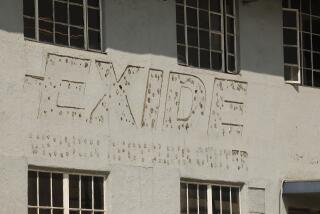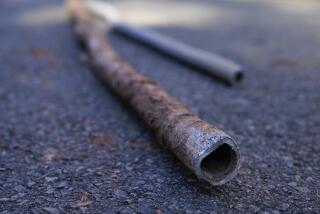Panel Expected to Deal New Blow to Use of Gas Additives
- Share via
WASHINGTON — A panel of experts convened by the federal Environmental Protection Agency is expected to report today that the use of additives that make gasoline burn more cleanly should be “reduced substantially” because they pose public health risks when they leak into water supplies.
According to Clinton administration officials, the committee will recommend that Congress ease a current law that dictates the widespread use of methyl tertiary butyl ether, or MTBE, in the fight against air pollution. The 13-member panel also will call on Congress and the federal government to identify and more efficiently clean up water supplies that have been contaminated by the smog-fighting oxygenate.
The new report--the result of six months of study by a group of environmental, public health and industry experts--is certain to deal a further blow to MTBE, which Gov. Gray Davis has ordered phased out in California by 2002. The panel’s chairman, Dan Greenbaum of the Boston-based Health Effects Institute, said Monday that Davis’ order will be far easier to implement if Congress acts on the panel’s recommendations.
Since its introduction in 1992, the additive MTBE has been hailed as a significant factor in improving air-quality in California and across the nation. According to the state’s Air Resources Board, the use of MTBE throughout California has reduced air pollution by the same amount as would removing 3 million to 4 million vehicles from the roads.
But MTBE also has been found to have contaminated drinking water wells in Santa Monica, Santa Clara and South Lake Tahoe, and is believed to threaten thousands of other wells in California. The additive, which is far more likely than other gasoline components to leach into distant water supplies, has been linked to cancer in lab animals and is considered to be a potential human carcinogen.
Prodded by state and federal requirements, California and other states have undertaken massive efforts to replace or repair leaky gasoline storage tanks and delivery pipes. But the EPA panel observed that even after repairs, some storage systems continued to leak MTBE and other harmful gasoline components. It called on the EPA to work with states to improve both the design of storage systems and the training and licensing of those who install them.
The panel also will urge federal and state officials to reorganize their environmental enforcement efforts to move quickly to identify drinking-water reservoirs vulnerable to MTBE leakage. To facilitate cleanup, the panel will call on Congress to approve the expenditure of the full $200 million accumulated annually in the Federal Underground Storage Tank Trust Fund from fuel taxes; currently, no more than $70 million may be spent each year.
“There needs to be some mechanism for improving cleanup in cases where a site has been abandoned by its owner or where responsible parties can’t be found,” said Greenbaum.
A Clinton administration official said that the EPA is expected to accept the bulk of the panel’s recommendations and, where possible, implement them through the regulatory process. But many of the group’s proposals will require congressional action.
That, officials said, is made more uncertain by the political cross-currents that have shaped the debate over gasoline additives. American farmers, who produce a competing oxygenate called ethanol, have been keen to see MTBE phased out. At the same time, oil companies and their sister corporations produce about 20 billion pounds of MTBE each year, making its manufacture big business. Beyond that, oil processors and refiners--following federal guidelines--have invested heavily in equipment that reformulates gas to include MTBE.
But states like California, which has acted more quickly than most to address the hazards of MTBE, also will be important voices in the debate. And California environmental officials for months have been seeking greater flexibility from the federal government.
Working with Davis, Sen. Dianne Feinstein (D-Calif.) has introduced legislation that would allow states to ignore strict federal guidelines on gasoline additives if they can find other ways to meet federal air-quality standards. The recommendations to be made today are likely to speed Congress’ consideration of such legislation.
More to Read
Sign up for Essential California
The most important California stories and recommendations in your inbox every morning.
You may occasionally receive promotional content from the Los Angeles Times.











